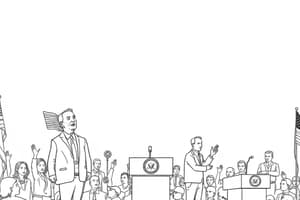Podcast
Questions and Answers
What significant event led to Nixon's resignation as President?
What significant event led to Nixon's resignation as President?
Watergate scandal
Who succeeded Nixon as President after his resignation?
Who succeeded Nixon as President after his resignation?
Gerald Ford
What election saw Carter lose to Reagan due to a lack of charisma during TV debates?
What election saw Carter lose to Reagan due to a lack of charisma during TV debates?
1980 election
Which President became the first in 50 years to not be re-elected in 1980?
Which President became the first in 50 years to not be re-elected in 1980?
What slogan did Clinton use to focus on the economy during the 1992 election?
What slogan did Clinton use to focus on the economy during the 1992 election?
Flashcards are hidden until you start studying
Study Notes
- Every four years, there is a new presidential election campaign in the USA, with the White House in Washington, DC, being the residence of the president.
- American election campaigns have set standards for democracies worldwide, with significant turning points and innovations over the years.
- In the 1960 election, John F. Kennedy and Richard Nixon competed for the presidency, with Kennedy representing change and Nixon continuity.
- The 1960 election was heavily influenced by the rise of television, with Kennedy using his family in campaign ads to appeal to voters.
- The first televised debate between Nixon and Kennedy in 1960 reached 70 million viewers and highlighted the power of television in shaping public perception.
- Kennedy's charismatic performance in the TV debate is believed to have been a significant factor in his election victory.
- In the 1964 election, Lyndon B. Johnson used emotional television ads, like the famous Daisy ad, to highlight the stakes of the election and secure his win.
- The 1968 election saw Richard Nixon make a successful comeback against Hubert Humphrey, utilizing professional campaign consultants and carefully staged town hall meetings.
- Nixon's strategic use of audience stacking in town hall meetings contributed to his successful election campaign in 1968.- After eight years, the Republicans won the White House in 1972 under Nixon's presidency, facing challenges like a faltering economy, high inflation, rising unemployment, and the unfulfilled promise to end the Vietnam War.
- Nixon demonstrated a strong understanding of geopolitics and made history by meeting with Mao Zedong in China, which garnered significant media coverage.
- George McGovern, a surprise Democratic nominee, ran against Nixon with an anti-war stance, advocating for military cuts that Nixon used against him in the campaign.
- Despite initial challenges, Nixon's popularity rose again as his strategy seemed effective until the Watergate scandal unfolded.
- The Watergate break-in at the Democratic headquarters by Republican campaigners led to questions of Nixon's involvement, sparking a series of investigations and uncovering illegal activities linked to campaign contributions.
- Nixon denied involvement in the Watergate scandal, but public trust wavered as evidence mounted against him, leading to his resignation.
- Gerald Ford succeeded Nixon, followed by Jimmy Carter's presidential campaign emphasizing honesty and transparency as a refreshing change from Washington politics.- TV debates in the US were avoided by candidates after the Kennedy-Nixon debate due to fear of negative outcomes, until Carter and Reagan faced off in 1980.
- Carter, the incumbent president, lacked charisma and wit compared to Reagan during the TV debates.
- Reagan won the 1980 election against Carter, who became the first president in 50 years not re-elected.
- The 1988 election saw Bush win against Dukakis, where Dukakis's lack of response to attack ads played a role in his defeat.
- The crime issue, especially highlighted by the Willie Horton case, was a significant factor in the 1988 election.
- Clinton won the 1992 election against Bush, focusing heavily on the economy with the slogan "It's the economy stupid."
- Clinton's personal issues, like accusations of womanizing, threatened his campaign but were addressed by Hillary's supportive public stance.
- Bush narrowly won the 2000 election after a recount in Florida, becoming the first president to win without the popular vote.
- Obama's 2008 campaign focused on change and utilized advanced data analytics for voter targeting and fundraising.
- Obama outperformed McCain in fundraising, with a significant portion coming from small online donations.
- Obama's successful use of the internet and data mining techniques played a crucial role in his victory.
- Private campaign funding remains a significant issue, with large sums coming from a small group of wealthy donors.
- The evolution of campaign methods has increased the effort and spending, but the final outcome remains unpredictable based on voter decisions.
Studying That Suits You
Use AI to generate personalized quizzes and flashcards to suit your learning preferences.




